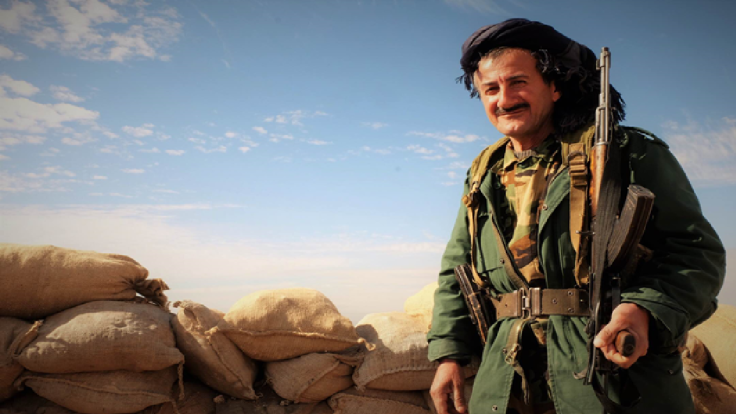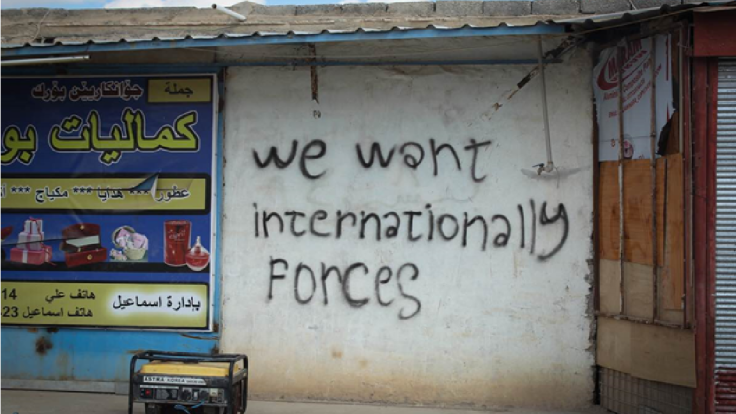Chilcot report: Meet the Iraqi Kurds who think George Bush and Tony Blair were saviours - not invaders
Saddam Hussein massacred thousands of Kurds during his al-Anfal campaign, and the US and UK removed him.
Fingers will be pointed, subdued anger will rear its ugly head and no doubt people with too much time on their hands will stand outside parliament calling for (more) blood for an otherwise forgotten legacy as Sir John Chilcot publishes his long-awaited report into the Iraq war today (6 July).
But as the media stirs up a hornets' nest before anyone even gets around to reading the 2.6-million-word document itself, it is worth taking a moment to separate one's self from the usual heated opinion and emotive reasoning to reflect upon some of the voices of people and places most have never heard of.
In Iraqi Kurdistan, the semi-autonomous region of Iraq where I have lived and worked for the last four years, signs of support for the US and UK can be found in the strangest of places and in the most unique forms. From stars and stripes taxi seat covers to a copy of Shakespeare's greatest works nestled in the corner of a refugee's tent, it is clear that our two English speaking nations are still held in high esteem.
Iraq's Kurds harbour a very unique position in the world – many of them even claim to love Bush and Blair for the war of 2003, something that is rarely admitted nowadays. So why is it then, that when most of the world seems to be itching for damning evidence against the "invaders" to be presented by the Chilcot Inquiry, this old and diverse corner of the world primarily views the UK and US as saviours?

Of course it is about context, and it is important to understand that while the rest of Iraq was tearing itself apart post-2003, Iraqi Kurdistan managed to (mostly) hold itself together. The war resulted in the removal of Saddam Hussein, a dictator that had killed between 50,000 and 180,000 Kurds during his murderous al-Anfal campaign – including 5,000 during the chemical weapons attack on Halabja.
As an old Kurdish Peshmerga fighter on the Bashiqa front line overlooking Mosul told me recently: "Amrika good, Britania good!"
On any front line of the current war against Islamic State (Isis) these are often the only words, complimented with a strong thumbs up, that a Brit such as myself may hear in English. For those that serve in the Peshmerga, the UK has been a source of strength and support. Over the years I have made many friends, from privates to generals who have only ever had a positive reaction to my own admission to being British.
"Most Kurds view the UK and US as their closest allies," said a Kurdish friend who served in the Iraqi Special Forces after 2003. "The invasion of Iraq not only saved the Kurds from Saddam but also put Kurdistan on the map in both the Iraqi parliament and internationally."
Looking past the newly opened string of fast food establishments such as Pizza Hut and Hardees, it is important to understand that for the Kurds (at least those that don't remember as far back as the 1920s), the US and UK are generally viewed with wide eyes and bonds of camaraderie.
For them the 2003 war resulted a golden age of freedom and opportunity. The Kurdish economy grew from strength to strength until 2014, when the oil crisis, war against IS and complete lack of diversification and foresight resulted in the current crisis we are in now – but this is another story.
It is important to remember, however, that Kurdistan is home to other minorities; Yazidis, Christians, Shabaks, Kakais, Turkomen. The list goes on. For them the feeling is not so clear cut.
Just forty miles west of Erbil, the capital of Kurdistan, lies the town of Qaraqosh, home to many of the Christians of Iraq. For many here, the Saddam years, although still marred with memories of fear and violence, are viewed with some nostalgia. "At least before 2003 we had our houses and we knew who to fear," says Karam, a Christian internally displaced person (IDP) that left for Erbil when the security in his hometown gradually degraded to the point of collapse, with IS taking over shortly after.
"Before the invasion things were not good and we hoped with the arrival of the US and UK the situation might improve', Karam continues. "But it soon became clear that bad things were done and the wrong choices were made. Now everything is destroyed. The US and UK are responsible for this."

The Yazidis have a somewhat contrasting opinion. Most speak fondly of the US and UK - for them the pragmatism of befriending Western nations outweighs the anger of what they have been through as a people. Despite the horrors of the IS campaign against these marginalised people, for many, while the UK and US must accept a degree of responsibility, there is little ill will towards them.
They are a people that have existed on the periphery of Iraq and Kurdistan for years and only hope that outsiders can in some way support their cause. I have spent a lot of time on Sinjar Mountain, accepting the limitless hospitality of displaced Yazidi families and listening to their stories, more often than not of plight and suffering.
On my first visit I was offered 5,000 loyal men who only needed the support of the Crown to win their villages back. As the father of my friend and host, Hade, puts it "we often talk of the British, wishing they would help us." As his grandfather used to say "When the British come to Iraq, that is good for you." Many would of course argue otherwise given the current state of affairs, but the reality does not numb the sentiment nor the historical context from which it stems.
But for some Yazidis, there emergence of IS – their tormentor – lies firmly at the feet of Blair and Bush.
"Yes, I like George Bush and Tony Blair because they destroyed a dictatorship and made the world aware of Iraq and the Iraqi people aware of the world. But IS is a result of their mistakes and they must shoulder that responsibility," said Seaad, a Yazidi academic and friend.
It is the legacy of the war that that we are living through now. There is no doubt that the mistakes our governments made, whether regarded as liberating or occupying forces, allowed for the exploitation of a colossal power vacuum, which in turn led to fertile grounds for the rise of IS that we see today.
But amidst the violence and the catastrophic collapse of statehood, there is a corner of the country that will remember the names Bush and Blair for different reasons.
Tom Robinson is co-founder and director of Rise Foundation, an NGO basted in Kurdistan providing targeted support to refugees and IDPs. He is writing in a personal capacity.
© Copyright IBTimes 2025. All rights reserved.






















